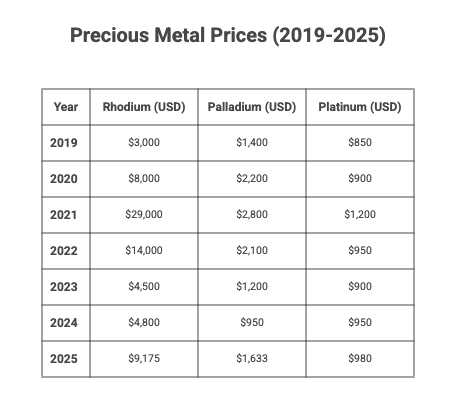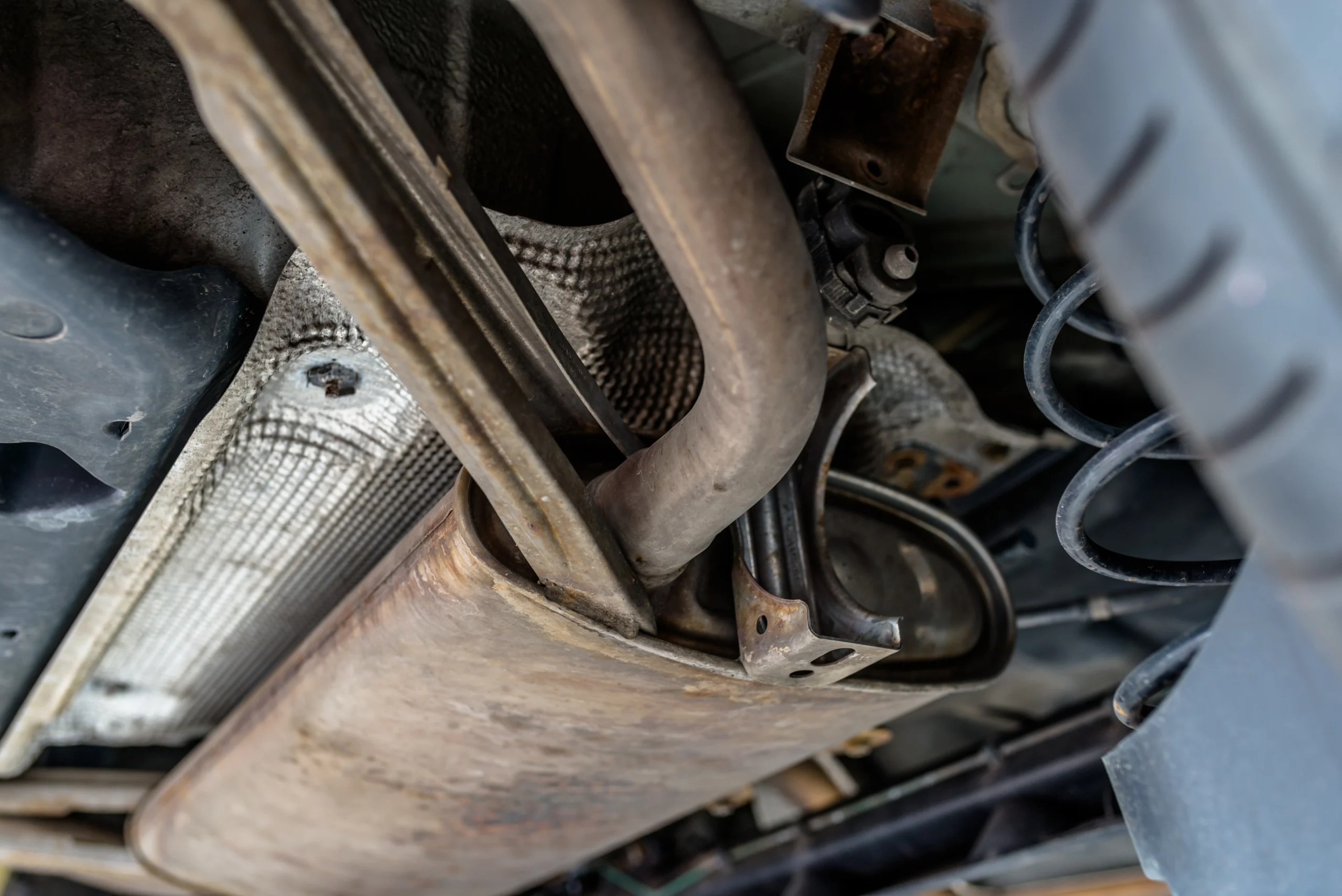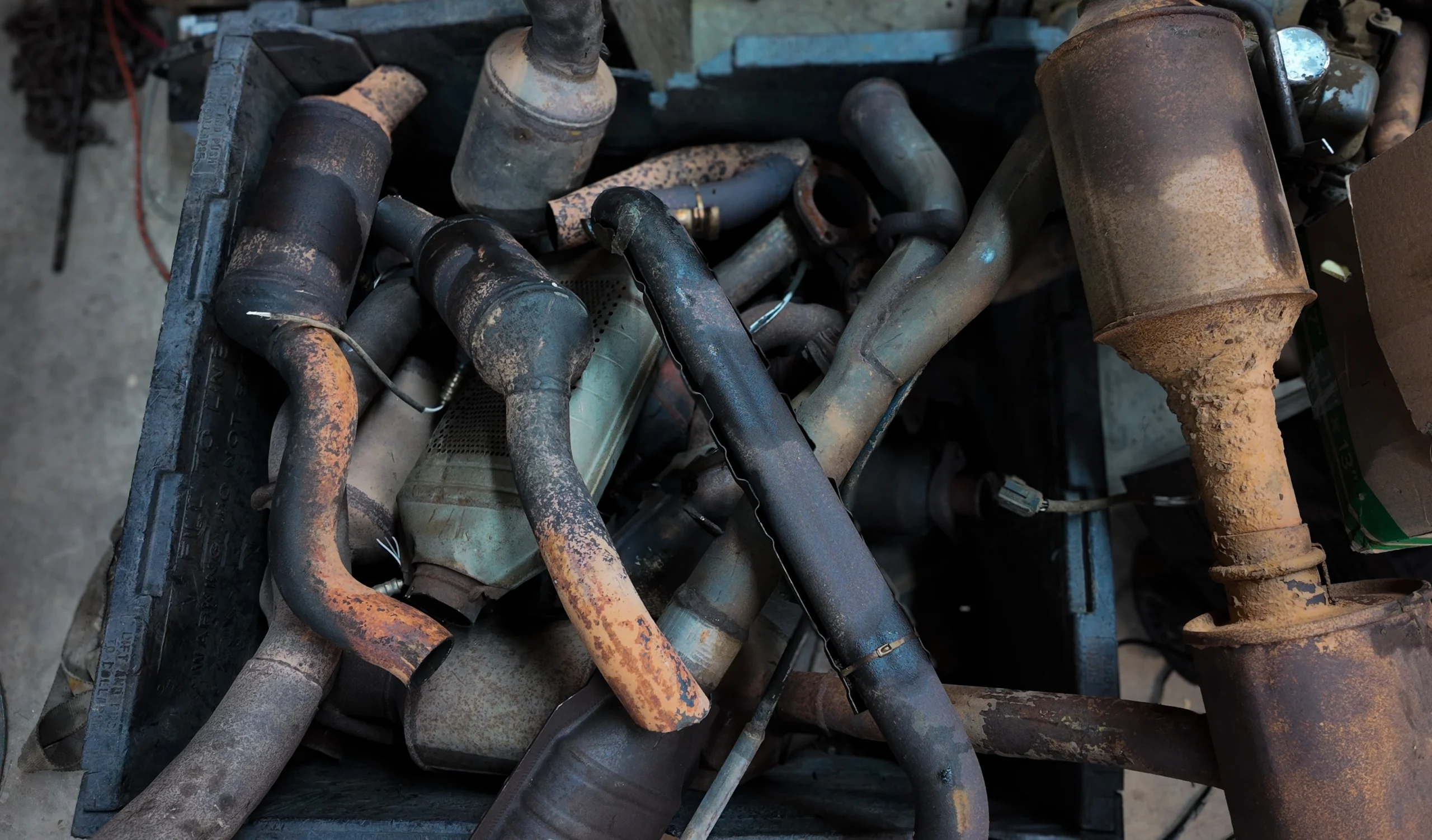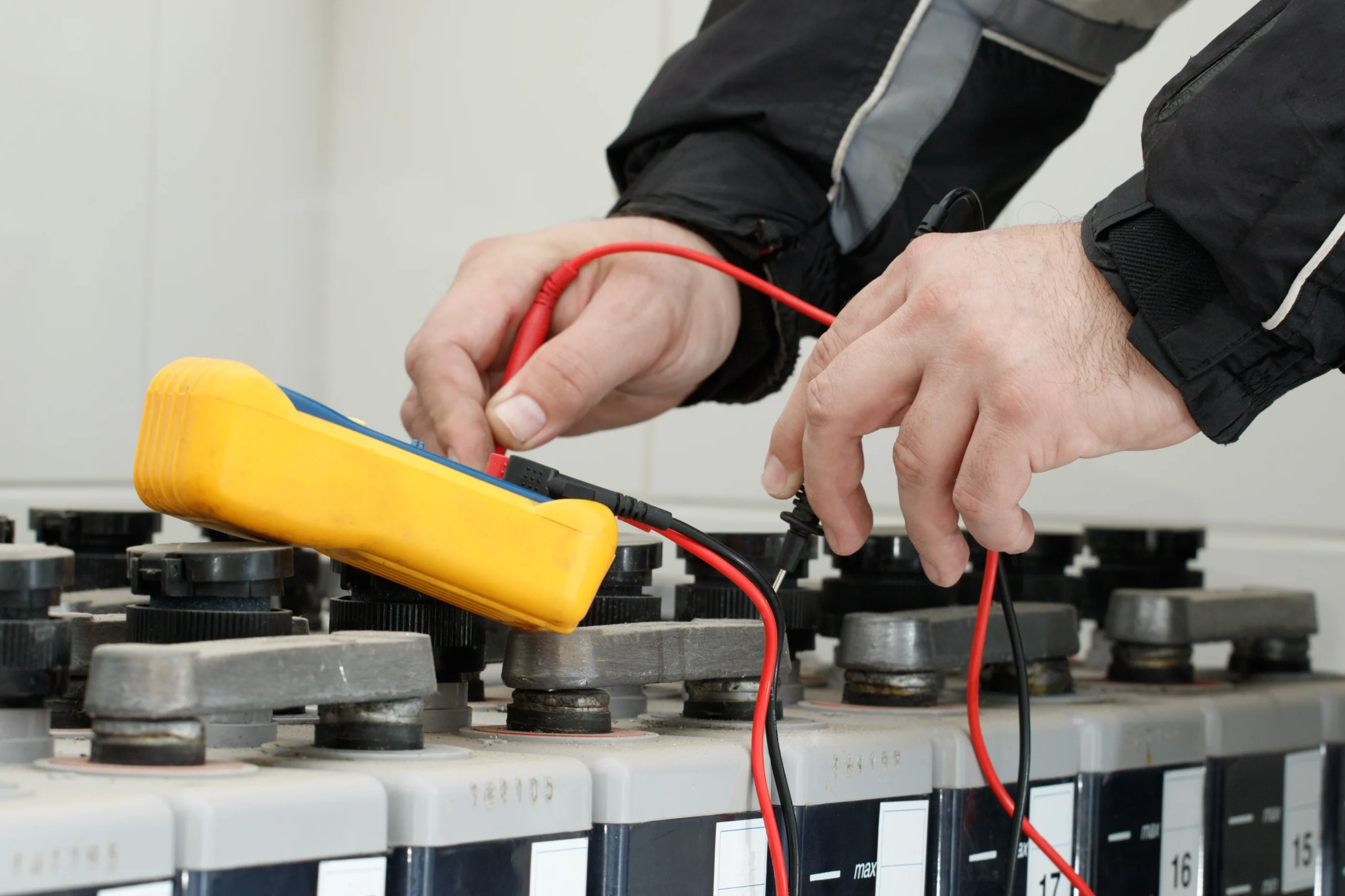Replacing a catalytic converter typically costs between $900 and $4,500 depending on your vehicle type, part quality, and labor rates in your area. This essential emissions control component contains valuable precious metals that make both replacement and recycling financially significant decisions for car owners in the UAE and beyond.
Whether your converter failed naturally, suffered damage, or was stolen, understanding the true costs helps you make informed decisions. Smart vehicle owners recognize that their old unit holds substantial value through professional recycling services. Companies like Recohub help offset replacement expenses by extracting precious metals from failed converters, potentially recovering 20–50% of your total repair costs.
Watch this informative video to learn more about catalytic converters and their value:
What Factors Determine Catalytic Converter Replacement Cost?
Vehicle make, model year, converter type, and regional labor rates determine your final replacement bill. The catalytic converter price varies dramatically because luxury vehicles require converters with higher precious metal concentrations than economy cars. According to the U.S. Environmental Protection Agency, properly functioning converters operate effectively for 100,000+ miles under normal driving conditions, making replacement a significant but infrequent expense.
OEM vs Aftermarket Converters: Which Should You Choose?
Original Equipment Manufacturer parts cost 40–60% more than aftermarket alternatives but typically last twice as long. OEM converters match your vehicle’s exact specifications and carry manufacturer warranties, while aftermarket options provide budget-friendly solutions that meet federal emission standards. Your choice depends on how long you plan to keep your vehicle and your budget constraints.
How Much Does Labor Cost for Installation?
Labor charges range from $70 to $200 per hour, with most replacements requiring 1–3 hours of work. Direct-fit converters bolt directly onto existing exhaust systems, reducing installation time significantly. Universal converters require cutting and welding, adding complexity and cost. Vehicles with converters integrated into exhaust manifolds demand more extensive labor, sometimes exceeding $500 for installation alone.
Catalytic Converter Replacement Cost by Vehicle Type
The following table provides current market estimates for complete replacement including parts and labor:
Vehicle Category | Parts Cost | Labor Cost | Total Estimate |
Economy Cars (Civic, Corolla) | $400–$900 | $100–$200 | $500–$1,100 |
Mid-Size Sedans (Accord, Camry) | $600–$1,500 | $150–$300 | $750–$1,800 |
Luxury Vehicles (BMW, Mercedes) | $1,500–$3,500 | $200–$500 | $1,700–$4,000 |
SUVs and Trucks | $800–$2,200 | $150–$350 | $950–$2,550 |
Hybrid Vehicles (Prius, Ioniq) | $1,800–$3,000 | $200–$400 | $2,000–$3,400 |
Why Are Catalytic Converters So Expensive to Replace?
Precious metals drive the high cost of catalytic converter replacement. Each converter contains 3–7 grams of platinum, 2–7 grams of palladium, and 1–2 grams of rhodium. These platinum group metals trade at premium prices on global commodity markets, with rhodium alone valued at over $4,000 per ounce during peak periods. The U.S. Geological Survey confirms that these metals remain essential for emission control technology, sustaining high demand and prices.

What Precious Metals Make Converters Valuable?
Platinum serves as the primary catalyst in diesel vehicle converters, facilitating chemical reactions that convert harmful exhaust gases into safer emissions. Palladium dominates gasoline vehicle converters due to its efficiency at lower operating temperatures. Rhodium, the rarest and most valuable of the three, specifically targets nitrogen oxide reduction. This precious metal content explains why your old converter retains significant value even after failure, making professional recycling an attractive option for cost-conscious vehicle owners.
What Happens If You Drive Without a Catalytic Converter?
Vehicles without functioning converters emit 10–15 times more harmful pollutants than properly equipped cars. Carbon monoxide, nitrogen oxides, and unburned hydrocarbons escape directly into the atmosphere, contributing to smog formation, respiratory health issues, and environmental degradation. Beyond environmental concerns, driving without a converter violates emission standards in most jurisdictions, resulting in failed inspections and potential fines.
Pollutant Type | Without Converter | Health & Environmental Impact |
Carbon Monoxide (CO) | 40–60 grams per mile | Reduces oxygen delivery in bloodstream |
Nitrogen Oxides (NOx) | 3–5 grams per mile | Creates smog and acid rain |
Hydrocarbons (HC) | 2–4 grams per mile | Causes respiratory irritation and cancer risk |
How Much Is Your Old Catalytic Converter Worth?
Your failed converter holds substantial value despite no longer functioning in your vehicle. The catalytic converter scrap price ranges from $50 for small aftermarket units to over $1,400 for hybrid vehicle converters containing higher precious metal concentrations. Understanding what happens to catalytic converters after collection helps you appreciate the importance of choosing legitimate recycling partners.
What Determines Your Converter’s Scrap Value?
Vehicle type significantly impacts scrap value, as luxury cars and trucks contain higher precious metal concentrations than economy vehicles. Converter age matters because newer units typically retain more catalyst material. Physical condition affects recovery rates, though functionality does not matter for recycling purposes. Current commodity prices for platinum, palladium, and rhodium directly influence what recyclers can offer.
How Do You Choose a Reliable Catalytic Converter Recycler?
Selecting the right recycling partner ensures you receive fair value while maintaining legal compliance. Asking the right questions to discover your catalytic converter recycling partner protects your interests and guarantees transparent transactions. Reputable companies like Recohub provide detailed pricing based on current market conditions, proper documentation, and professional handling throughout the process.
Professional recyclers maintain sophisticated assay equipment to accurately measure precious metal content in each converter. They offer competitive pricing tied to real-time commodity markets rather than arbitrary estimates. Legitimate operations provide receipts and maintain records proving legal ownership, protecting both buyers and sellers from potential legal complications.
Why Should You Recycle Your Old Catalytic Converter?
Professional recycling delivers both financial and environmental benefits. Recovering precious metals from used converters requires significantly less energy than mining new materials, reducing carbon emissions associated with primary metal extraction. Recycled platinum group metals support new converter manufacturing, creating circular supply chains that decrease pressure on limited natural resources.
Responsible recycling prevents valuable materials from ending up in landfills where they provide zero benefit to anyone. Instead, recovered metals re-enter manufacturing processes, supporting sustainable automotive production. Partnering with established recyclers like Recohub ensures your old converter contributes to environmental sustainability while providing you with fair financial compensation.
How Can You Reduce Your Total Replacement Costs?
Strategic planning helps minimize your financial burden when facing converter replacement. Start by obtaining multiple quotes from different mechanics to ensure competitive pricing on both parts and labor. Consider aftermarket converters if your budget is tight and you don’t plan to keep the vehicle long-term. Most importantly, recycle your old converter through professional channels to recover substantial value.
Vehicle owners who recycle their failed converters with Recohub typically recover 20–50% of their total replacement costs. This significant offset transforms an expensive repair into a more manageable expense. The combination of competitive replacement quotes and professional recycling creates the most cost-effective approach to handling converter failure.
Partner with Recohub for Maximum Value Recovery
Recohub specializes in catalytic converter recycling services across the UAE, providing accurate assessments based on current market conditions. Our experienced team handles everything from initial evaluation to final payment processing, ensuring a smooth and transparent experience. We use advanced assay technology to determine precise precious metal content, guaranteeing you receive fair compensation for your converter.
Your old catalytic converter represents valuable resources that deserve professional handling. Don’t let expensive replacement costs burden your budget unnecessarily when significant value remains in your failed unit. Contact Recohub today to discover what your converter is worth and transform your costly repair into a smarter financial decision. Our commitment to transparent pricing and environmental responsibility makes us the trusted choice for vehicle owners throughout the UAE seeking maximum returns on their recyclable automotive components.
FAQ
How long does a catalytic converter typically last?
Most catalytic converters last between 100,000 and 150,000 miles under normal driving conditions. Proper vehicle maintenance, using quality fuel, and addressing engine problems promptly help extend converter lifespan. Factors like oil burning, coolant leaks, or engine misfires can significantly shorten this timeframe.
Can I drive my car without a catalytic converter temporarily?
While technically possible, driving without a catalytic converter is illegal in most jurisdictions and causes severe environmental harm. Your vehicle will fail emission tests, produce excessive pollution, and may trigger check engine lights. Most regions impose substantial fines for operating vehicles without functioning emission control systems.
Why do hybrid vehicles have more valuable catalytic converters?
Hybrid vehicles contain higher concentrations of precious metals, particularly rhodium, to meet stricter emission standards. Since hybrid engines run less frequently than traditional combustion engines, converters operate at lower temperatures and experience less degradation, preserving more catalyst material for recycling.
How do I know if my catalytic converter needs replacement?
Common signs include illuminated check engine lights, reduced engine performance, sulfur or rotten egg smells from exhaust, rattling noises from underneath the vehicle, and failed emission tests. A diagnostic scan can confirm converter-related trouble codes, while physical inspection reveals external damage or theft.
What documentation do I need to sell my old catalytic converter?
Legitimate recyclers require proof of ownership, typically vehicle registration or a title matching your identification. Some regions mandate additional documentation such as mechanic invoices showing the converter was professionally removed. Reputable companies like Recohub guide you through documentation requirements to ensure fully compliant transactions.







